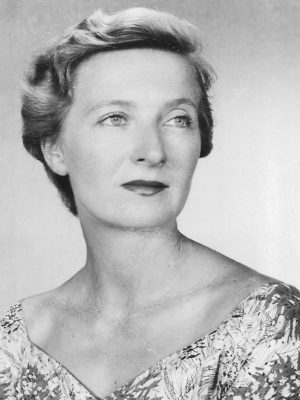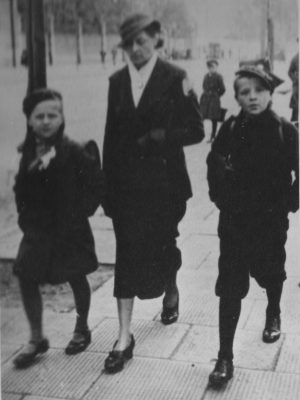Hanna Antonina Pawłowicz was born on a very cold November 26th in 1928 in an army hospital in Warsaw, Poland.
Family Background
Her parents were Bohdan Pawłowicz and Wanda Orla-Salmonowicz. She had an older brother, Leszek Kazimierz Pawłowicz.
In 1952 she got married to Edward Juzwiak in Rio de Janeiro, Brazil and had four children: Barbara Wanda (1953-), Mark Piotr (1957 -) and the twins Edward Paulo and Jurek Bohdan (1961-).
Childhood
From her birth to the age of 6 approximately, she lived with her family at her grandparents place, a comfortable house with a big garden on Goraszewska 8 Street in the Czerniaków housing estate in Warsaw. She also started her primary school there. The family gathered every summer to spend their holidays either at the family property (Willa Kazimierza Pawłowicza, ul. Kaszubska 3) in Jastrzębia Góra by the Baltic Sea or in the mountains.
In September 1935, she moved to Łódź , where her father had been transferred to work as director of the radio station. Her childhood memories of this industrial city – then the second largest in population after Warsaw – were of a terribly dirty place with open sewers.
Shortly afterward, the family relocated to Toruń.
World War II
In the fateful year of 1939, at the end of July, her father had already embarked on the inaugural voyage of the Chrobry to Brazil. By mid-August, while the children were in the mountains, their mother received a telephone call from the mayor of Toruń, advising them to return to the city as quickly as possible and relocate to their family home in Warsaw.
Hanna then followed her mother and brother to her grandmother’s house in Czerniaków and later to her aunt and uncle’s home in Łuck.
In April 1940, at the age of 11, she fled Poland together with her mother Wanda and her brother Leszek. They all came to Brazil, where they settled.
Brazil
Curitiba
Initially, the family lived in Curitiba, in the state of Paraná. Neither Hanna nor her brother spoke Portuguese at the time. While her brother Leszek was sent to the Salesian school, Hanna was first enrolled at Colégio São José, where the nuns placed her in primary school and treated her as if she were incapable of learning. After three months, she begged her mother to change schools, as she felt she wasn’t making progress and could no longer endure the treatment. Wanda managed to secure her a scholarship at Colégio Sion in Curitiba, where she entered the last year of primary school. At the end of the year she sat an entrance test and was placed in secondary school. The French-origin nuns there were more open and more aware of the ongoing events in Europe and allowed Hanna to listen to and discuss news about the war, which she highly appreciated. She learnt Portuguese in no time.
The trio lived in a wooden house with a backyard, where chickens roamed, and the pigeons that occasionally landed in the garden were caught and cooked. Wanda worked very hard to make ends meet at the Instituto do Mate, while the children attended school and helped her with the housework. They also rented out a room to two people to supplement the household income.
They occasionally received letters from their father, who was serving in the Polish Navy in England. However, according to Hanna, these letters were heavily censored, with black lines obscuring much of the text. Most of the legible communication to Wanda consisted of phrases like “I love you,” “I miss you,” and “Hug the children.” The family stayed in Curitiba for 2 years.
Rio de Janeiro
When her father arrived from London in 1943 to join the Polish Legation in Rio de Janeiro as Assistant Naval Attaché, the entire family relocated to Rio de Janeiro. Initially, everything went well, as Bohdan’s position allowed the family to live in a small but comfortable apartment in Copacabana and provided enough income for Wanda to stop working. Hanna was enrolled at Colégio Sion to finish her middle school and high school.
However, the good times did not last long. After the war, the Polish Government in Exile in London was no longer recognized by the Allied Forces, and her father was discharged from his position in 1946. Although he tried hard to secure a job or occupation, Bohdan lacked the necessary skills for business and faced repeated failures.
Once again, the family experienced difficult times, and Wanda had to return to work, this time at the Post Office. Meanwhile, Hanna received a scholarship from Colegio Sion, from where she graduated from secondary school with high honors in 1948. She also secured a position as a secretary at the Indian Consulate in Rio, which provided her with her own income for the first time.
In a recording about her life, made at the request of two of her grandchildren a few years before her death, she described how she was initially treated by the employer at the consulate and how she earned respect through her posture:
“The first day on the job was very unusual for me. I had a desk in the same room as my Indian employer. He threw the papers he wanted me to work on from his desk. They fell to the floor in the middle of the room. I looked at the papers and then at him. He looked back at me, and I continued to look at him, saying I wasn’t going to pick them up. I told him that if he wanted me to work on them, he should bring them to my desk. Finally, he stood up, picked them up from the floor, and brought them to me. I made him understand that for me, this was a matter of respect.
From then on, he and the entire staff were very friendly and helpful. I was invited to consulate meetings and parties, and I think they were impressed when they learned I had a full scholarship to Wellesley, a college that was well-known and highly regarded in Asian countries.”
In 1949, as a result of her academic excellence and interest in studying abroad, she followed the advice of a family friend, Mary Wheeler to apply to several colleges in the U.S., which she did. She was accepted by several, including Wellesley College in Massachussets, which awarded her a full scholarship.
US
At Wellesley, she was able to skip her sophomore year and pursued a liberal arts curriculum. She graduated in three years (instead of four) with high honors and received a Bachelor of Arts degree in 1952.
Santos
On her return from the US, she married Edward Juźwiak in Rio de Janeiro, Brazil on September 6th 1952 and in August 1953, their daughter Barbara Wanda was born. In September 1953 they moved to Santos, where Edward was offered a post in a shipping company. In 1957, Mark Piotr was born and in 1961, the twins: Edward Paulo and Jorge Bohdan.
She was the grandmother of twelve children:
- 3 boys by her daughter Barbara Wanda Juzwiak (married to Pierre René Paul Dieu): Jean Marc Dieu, Jacques Edouard Dieu, Christophe André Dieu;
- 3 girls by her son Mark Piotr (married to Marianne, née Collard): Sybil Doyle [née Juzwiak], Kalina Juzwiak, Maja Juzwiak;
- 1 girl and 2 boys from her son Jorge Bohdan (married to Cláudia, née Ridel): Teressa Ridel Juzwiak, Aleksander Ridel Juzwiak, Viktor Ridel Juzwiak;
- 2 girls and 1 boy from her son Edward Paulo (divorced from his wife Trudy, née Batt): Stéphanie Batt Juzwiak, Darek Batt Juzwiak and Wendy Batt Juzwiak.
and, at the time of her death, the great-grandmother of three girls:
- Melina Azevedo Dieu (from her grandson Jacques, divorced from Vera Azevedo)
- Leia Dieu Banuet (from her grandson Jean Marc, married to Mercedes, née Banuet Guiot).
- Aliyah Antonina Doyle (from her granddaughter Sybil, married to Jason Doyle)
Late Years and Death
Hanna died at the age of 89 of complications resulting from a malignant carcinoma in Santos, Brazil on February 8th 2018. She was cremated at the Memorial Necropole in Santos. According to her and her husband’s wishes, the biodegradable urns containing their ashes were thrown into the sea in Juquehy, on the north coast of São Paulo.
Affiliation: Roman Catholic.
Languages: She was fluent in Polish, English, Portuguese and could communicate very well in French.
Hobby: used to play (a lot of) tennis and bridge.


